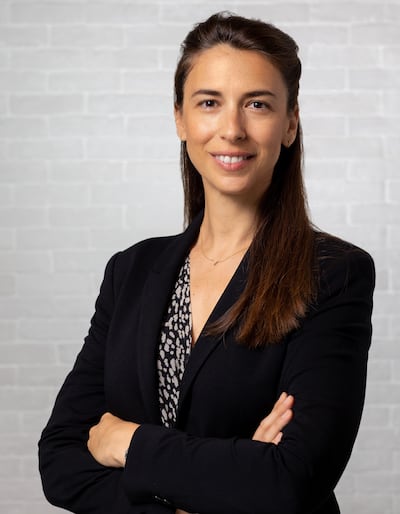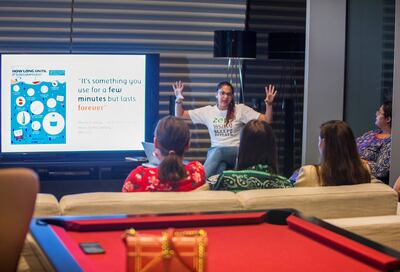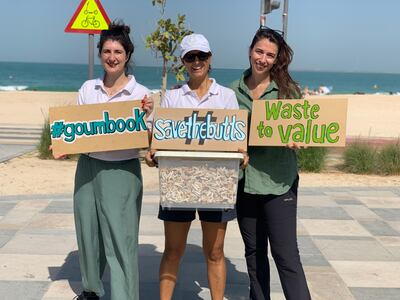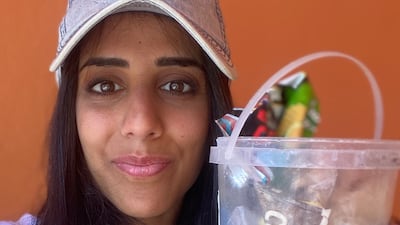Economic woes now trump environmental concerns around the world, according to a recent study by market research company Ipsos.
While sustainability still ranks within the top five issues in many countries, there is also a growing feeling of despondence among people as to how much impact they can make on an individual level.
This is compounded by feelings of climate anxiety or eco guilt, as well as an unexpected increase in climate scepticism, which, according to the research, has consistently grown over the past three years, particularly in France but also Saudi Arabia and the UAE.
This is not a matter of denial but more a belief that the entire notion is “mainly due to the kinds of natural phenomena that the Earth has experienced throughout its history”, and not necessarily human activity.
Some research, however, has suggested such indifference is a myth. Instead, it’s the lack of public discussion, particularly among informal social circles, that ultimately hampers individual contribution.
So how can we still make a difference?
“It’s very important for all of us to recognise our collective consumer power is more than we think,” Amruta Kshemkalyani, founder of Sustainability Tribe and AK Sustainability Advisory, told The National. “We need to start saying 'no' to the products and services that are harmful for the climate, biodiversity, human health, collectively.”

Ms Kshemkalyani was one of the first certified sustainability consultants to work in the region, starting out about 16 years ago. “I’ve seen the worst of it,” she said. “People used to ask me what sustainability even meant. From then to now I have seen the overall transition of the market to a more sustainable and green economy, as well as awareness rising in society.”
At the same time, she has noticed this increase in awareness has not necessarily translated into action. “We do have well-aware people but we do not have people contributing.”
She often sees this lack of action turn into anxiety or guilt. “We do not need people to know the technicalities of keeping the Earth’s temperature from rising more than 2°C — it’s important how these complex topics are translated into simple actions that anyone can understand and contribute to.”
Is going ‘zero waste’ the answer?
While there are many ways people can contribute to mitigating climate change — from switching to a renewable energy source and using public transport to decreasing meat consumption — one of the most widely recognised and accessible ways is by reducing waste, or going “zero waste”.
This concept is founded on the principle of the “5 Rs”: refuse, reduce, reuse, recycle and rot. It starts with refusing what you don’t need; reducing what you do; reusing, repairing or repurposing what you buy; recycling what you can; and composting organic materials to create nutrient-rich soil.
It is estimated that about 70 per cent of global greenhouse gas emissions come from the materials economy, and the waste sector accounts for 20 per cent of methane emissions worldwide, says the Global Alliance for Incinerator Alternatives, a greenhouse gas that’s 80 times as potent as carbon dioxide.
A 2022 study from Gaia finds zero-waste strategies could reduce global waste emissions by 84 per cent, or 1.4 billion tonnes, which is the equivalent of taking 300 million cars off the road each year.
This is where individual efforts can have a significant impact.
Yet “zero waste” is a “very ambitious terminology”, said Tatiana Antonelli Abella, founder of Goumbook, a social enterprise that promotes sustainable living and ESG (environmental, social and governance) principles in the UAE.
“I don’t think it is possible by one single person,” she told The National. “It needs to be part of an ecosystem … we need to get out of the linear economy of getting resources and dumping — and we need to look at circularity. This is applicable not just with day-to-day items like shampoo and grocery shopping but food waste, the way I dress, the clothing I buy, the water I consume.”
But even small cuts from one person can make a difference, said Mariska Nell, an artist who lives between the UAE and Australia and who now accumulates 500ml of waste every four to five months. A few years ago, in an experiment in Dubai, Nell decided to wear her trash for 30 days, a campaign she said led to some interesting conversations with people she met in public.
She produced two to three kilograms of waste a day, the global average at the time, while a friend attempted to create as little as possible. "It was shocking to see the difference just a few changes made. After one month, I had 65kg, while my friend had four.
"Reducing that waste of one person for one year, that's a lot. It really, really adds up."
The first steps to ‘low waste’
Ms Abella’s first step to a low-waste lifestyle 15 years ago was to install a water filtration system.
Ms Kshemkalyani, on the other hand, suggests tackling food waste first, as it’s “one of the most impactful, sustainable lifestyle contributions we could all have”. By that, she means choosing more climate-friendly and social-friendly, sustainable foods, including what’s locally available and seasonal, but also reducing red meat, for example.
Ms Abella agrees this is a good place to start. “One third of all the food produced in the world goes to waste. That’s enough to feed all the people who are in hunger.”

Ms Nell suggested people start with a "bin audit". "The top five items, reduce."
One thing all of the experts agree on is that you have to start small and change your habits one by one.
“It’s a journey,” said Doua Benhida, who started The Zero Waste Collective in the UAE. “It’s not a sprint, it’s a marathon. It’s not how fast we go, it’s about how we adapt our lifestyle. We have to train.
“Yes, you might forget your reusable bag, take the plastic bag but reuse it, do arts and crafts with your kids, for example.”

Other simple first steps the experts suggest include buying a reusable water bottle, coffee cup and bag; bulk-buying groceries from the supermarket and refilling your own containers with nuts, beans or cheese, for example; and turning the tap off while you’re brushing your teeth.
“That might sound very tiny,” said Ms Kshemkalyani, "but imagine eight billion people doing that together; imagine how big the water savings could be.”
Knowledge is power
“First of all, research,” said Marta Roman, who works as a campaign manager at Goumbook. “You need to understand what zero waste is and how you can apply it to your life — as it’s different for a family of five or a single person in an apartment.”
Once you understand, “try to be the voice”, Ms Roman added. “This is not a solo job, it requires community. Use your voice, become ambassadors, help others learn about it.”

Ms Benhida agrees. “Use social media, follow influencers, watch documentaries, as this is a great way to know about the problem and the solutions.”
Zeina Alhashmi, a sustainability specialist at Adnoc, says using Instagram, where she shares her family’s efforts, has helped her in her mission. “Read and follow things so your algorithm starts changing,” she said. “The more I started seeing, the more I learnt and read.”
She also suggests getting involved in clean-ups, which she said were an “eye opener”, particularly on the islands around Abu Dhabi, where waste contractors don’t go. “We’re so privileged in the UAE as we don’t see the impact of our consumption, because of the people who wake up at 4am and 5am to clean the streets. We don’t see the waste, landfill, even smell the waste — we don’t see the reality of it.”

Avoid overwhelm
While there are many steps we can take, it’s also important not to get overwhelmed, warns Ms Roman. “A quote I read recently that applies here is, ‘If you’re tired, learn to rest, not to give up’."
Ms Kshemkalyani, who is also close to zero waste in her personal life, agrees “being kind to yourself” is key. “One of the things I tell myself through difficult days is it’s OK to give yourself a bit of breathing space in between … if we’re kind to ourselves in the long run, we can keep doing the good work.”

